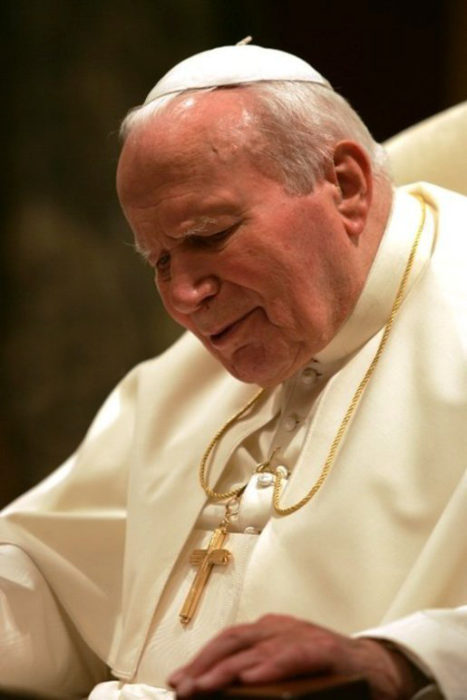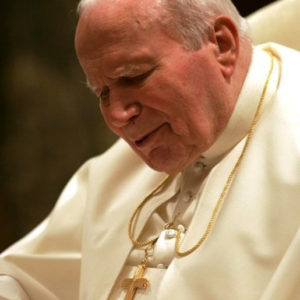
“How can Catholic belief in infallibility survive Pope John Paul II’s terrible misjudgments about McCarrick, Pope Benedict’s decisions about sanctions against him, and Pope Francis’ comments not only about civil unions, but his decision to canonize John Paul II?” That’s the question that I explored in a recent piece for Our Sunday Visitor. After pointing out that Jesus prays for us all to be one (John 17:20) and that St. Peter warns us to avoid heresies (2 Pet. 2:1), I said in part:
It’s important to recognize that these warnings against heresy and schism were not things to avoid in the first century. Peter was warning us — and Jesus was praying for us — in the future. So we can’t use the excuse that things are different these days. They were talking about our days, not their own. But this logically requires infallibility. If the Church were ever to command us to believe something false, we would be in an impossible position, a sort of Catch-22 in which we were forced to choose between heresy or schism, despite both ways being forbidden us. The medieval theologians had a name for such a situation: a perplexus simpliciter, in which every action is sinful. And they saw clearly that it was impossible that God should ever put us into such a situation, since it would be contrary both to his loving and rational nature to force his people to do what he forbade them from doing. [….]
Infallibility is the belief that God will never put us into this Catch-22, not because the pope is so holy, but because God is. We can fully embrace Church unity because we rest secure that in doing so, we’re also embracing the one, true faith. This is why St. Thomas Aquinas says that the canonization of saints is infallible. He offers two reasons: first, that “it would be a damnable error to venerate sinners as saints, since those discovered their sins or heresy (if it so happened) could be led into error”; and, second, that “the common judgment of the Church cannot be erroneous” for the simple reason that “we are bound to believe what the Church commonly decrees.” Since we have to believe it, it must be true, or else we’re back in that Catch-22 again. And since we can count on God not to trap us like that, we can therefore know with certainty that canonizations (including that of St. John Paul II) are trustworthy.
If you’re interested, I’d encourage you to check out the full piece (it’s not that long), and let me know in the comments here what you think. And finally… St. John Paul II, pray for us!

It appears that JPII was deceived. Those who deceived him about McCarrick — including McCarrick — are the sinners.
You are exactly right about infallibility, because without it, everything becomes folly.
In the McCarrick report, an attempt to justify John Paul’s actions or lack of steps in the McCarrick case was due to his experiences in Poland and the Communism Government allegations again Priests is laughable. Surely, he could realize the differences between Poland to the US. But, what is telling about John Paul came into view in 2002 and 2003. Cardinal Bernard Law confirmed he knew about Priests sexually abusing children, and Law did nothing about it and continued to act as an enabler. When all this came out, what steps did John Paul take? Other than to get him out of the US – nothing. One would have to believe in fairy tales to assume that the Vatican didn’t know about the issue’s size and scope. The cases are too many, and in so many locations, you would have to be blind, deaf, or dumb not to recognize the problem’s systemic nature.
Hi guys
Every once in a while I try to give an unbiased hand. My dad was catholic, grandmother, I went to catholic school as a child, I’m not a crazed Protestant..
Guys, I really believe, for many Catholics, it really just comes down to a lack of faith. Please understand, many…. Oh sooo many denominations, and individuals, do precisely the same thing.
You do not accept, you cannot see, you will not hear, and will not allow yourselves to comprehend what is so obvious that its practically a pathology. Your church is just a denomination and your faith will not allow you to accept that.(I’m speaking in general, not personally you)
I’m not going to list the crimes and unbiblical doctrines, you know the horrors, and you clearly see New Testament Christianity in no way matches your church.
PET doctrines, (Calvinism), Sabbath keepers, Charismatic Tongues etc etc…. it’s all the same. People latch onto the group that they feel assures them that they have the Holy Spirit. “I believe the same thing that So & So believes, so I know I’m safe. I’m in the correct faith.”
Your church is no different. Only it destroyed, and not through faith or love, all who had different interpretations, and it amassed the power to accomplish that, exactly how the Pharisees would have.
You reason the sheer number of Years they were in power as proving something, while forgetting the entire story of the Jews. It’s Souls not years and it’s not even close as to how many people have heard the New Testament Gospel since the Bible has been in print.
God accomplishes his purpose and not one of the Elect has been lost because of any denominations errors. That number existed before time began and is not impacted one bit by the number of years Ahab did evil in sight of the Lord in 900BC, or countless other weak Hebrew kings, or grossly mistaken Popes.
God gives the Holy Spirit to those who by grace, have faith in Jesus Christ and all the Pet doctrines and devices man uses to make sure that he’s safe, that he’s got the special truth that separates Him from the others who are not enlightened, are just an Overt demonstration of faith that is hopelessly weak.
Sorry for the soap box but so much of Christianity is in slavery to what is essentially Psychology 101. It’s a self defense mechanism that in Catholics case causes almost a total blindness to the dead Fruit of your doctrines & organization, and a whistling passed the graveyard in regards to the homosexuality and congregation that is so uneducated in God’s word that some never heard of Moses.
You’ve done some very fine work in many areas of charity, and produced many wonderful thinkers, and there is great potential waiting but You’ve already got proof that you’re only a denomination and are not even in the conversation as to being the closest to God. You just will not let go of your True Church narrative. You refuse to see it, even though everybody else does.
I pray for the day all denominations throw away their Pets, scrap their unbiblical doctrines and idol worship, and rest in the simplicity of Christ’s gospel, the Law of Christ, and demonstrate true Faith that needs nothing to mark us off as *special but the indwelling of the Holy Spirit who testifies with our spirit that we are children of God.
Peace
Amen, amen. It is probably not too much to describe as a cult any denomination which teaches that only its own members are “saved”, that all others are in grievous error and at risk of damnation, etc. etc.
I just listened to a long talk by “Father” Rippenburger, a RC exorcist. Jocular, flippant, repeated little digs at Protestants, all delivered in a sort of “after dinner speech” manner. A latin blessing to open and close rattled off like a train station announcement, and this is one of the more perceptive members of the RC clergy, at least in some respects.
https://www.brighteon.com/2a4cc7d5-7d20-4334-9944-74c9433e02b7
No matter I suppose, there will be no trouble on the part of the reapers in separating wheat from tares, regardless of their affiliations.
What about the Buenos Aires document, affirmed by Francis to be part of his authentic magisterium, paragraph 6, which suggests that divorced and remarried persons can access communion without even a purpose of avoiding sexual relations in the new union? http://www.vatican.va/archive/aas/documents/2016/acta-ottobre2016.pdf
Are we:
1. Obliged to give a strained interpretation to this in which it doesn’t say what seems to be its purpose?
2. Allowed to ignore it because of the strange nature of the document despite being repeatedly affirmed by Francis to be part of his teaching?
3. Or, because it is an instruction to priests on how to regulate who to give communion to, permitted to treat it as “discipline” as opposed to teaching?
Option (3) seems to be the least troubling to me. After all, there are certainly instances of objectively sinful behavior that the Church has not condemned before (e.g. certain slaveholders), and doing so does not abrogate the teaching or call into question infallibility. But I’m interested in your thoughts on this perplexing question.